2021 in review: a rather cranky year for Skeptical Science
Posted on 30 December 2021 by BaerbelW
The year 2021 was a rather "cranky" one for our team! For one, quite some research was cranked out - i.e. published - by team members and for another, a particular Cranky Uncle started to make the rounds throughout the year. As in previous recaps, this one is divided into several sections:
|
Scholary publications, projects and books |
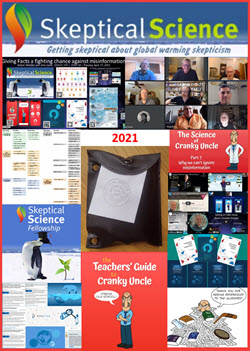 |
Skeptical Science Inc.
The process we started towards the end of 2020 to incorporate Skeptical Science as a registered nonprofit organization was completed on March 17, 2021 when our application to the U.S. Internal Revenue Service for 501(c)(3) status was approved.
|
We had decided to become an IRS-scrutinized and supervised 501(c)(3) entity in order to
|
If you have missed this development and are interested to know more about it, please check our blog post in which we go into more details.
Scholarly publications, projects and books
Several members of the SkS-team were lead- or co-authors of peer-reviewed and conference papers published during 2021. Here is a list of some of them:
The Benefits of Continuous Local Regression for Quantifying Global Warming
David C. Clarke, Mark Richardson (AGU ESS, February 2021) - It turns out that calculating the exact amount of global warming to the latest date with good statistical uncertainties is harder than you might think. That's why the IPCC often report "warming until the last decade" instead of "warming until the last year", e.g. 2011--2020 instead of 2020. David Clark and Mark Richardson show that a particular technique called LOESS gives reliable, unbiased estimates and global warming through 2019 best estimate is: "1.14°C with a likely (17%–83%) range of 1.05°C–1.25°C"
Inoculating against COVID-19 vaccine misinformation
Sander van der Linden, GrahamDixon, ChrisClarke & JohnCook (EClinicalMedicine, March 2021)
Using an interdisciplinary MOOC to teach climate science and science communication to a global classroom
Bärbel Winkler & John Cook (EGU General Assembly, April 2021) - Link to presentation
Giving Facts a fighting chance against misinformation
Bärbel Winkler & John Cook (EGU General Assembly, April 2021) - Link to presentation
Inoculation theory in the post-truth era: Extant findings and new frontiers for contested science, misinformation, and conspiracy theories
Josh Compton, Sander van der Linden, John Cook & Melisa Basol
Consensus on Consensus: Countering Misinformation Targeting Expert Agreement on Climate Change
John Cook (May 2021). World Science Encyclopedia of Climate Change: Finance, Economics and Policy. (World Scientific, May 2021)
Skeptical Science
Bärbel Winkler, Ken Rice, Timo Lubitz & John Cook. World Science Encyclopedia of Climate Change: Finance, Economics and Policy. (World Scientific, May 2021)
Global mean frequency increases of daily and sub-daily heavy precipitation in ERA5
Maria J Chinita, Mark Richardson, João Teixeira and Pedro M A Miranda (ERL, July 2021) - This is a new global reanalysis which is the best estimate of worldwide hourly weather since 1979 and in that dataset the authors find increases, on average, in how often heavy precipitation occurs.
The Impact of Emotion and Humor on Support for Global Warming Action
McKasy, M., Cacciatore, M. A., Yeo, S. K., Zhang, J. S., Cook, J., & Olaleye, R. M. (Annual Conference of the Association for Education in Journalism and Mass Communication, August 2021)
Future changes in planktic foraminifera habitat potentially unprecedented over the past 20,000 years
Peter Jacobs, Kim de Mutsert & Harry J. Dowsett (ESA, August 2021)
Teaching students how to spot climate misinformation using a cartoon game
John Cook (Plus Lucis, September 2021)
Climate Scenarios and Reality
Gavin A. Scmidt & Peter Jacobs (Issues in Science and Technology, Fall 2021)
Consensus revisited: quantifying scientific agreement on climate change and climate expertise among Earth scientists 10 years later
Krista F Myers, Peter T Doran, John Cook, John E Kotcher & Teresa A Myers (ERL, October 2021)
Pliocene decoupling of equatorial Pacific temperature and pH gradients
Madison G. Shankle, Natalie J. Burls, Alexey V. Fedorov, Matthew D. Thomas, Wei Liu, Donald E. Penman, Heather L. Ford, Peter H. Jacobs, Noah J. Planavsky & Pincelli M. Hull (Nature, October 2021). Peter did a short Twitter thread about this paper upon publication.
Correction Format has a Limited Role when Debunking Misinformation
Briony Swire-Thompson, John Cook, Lucy Butler, Jasmyne Sanderson & Stephan Lewandowsky, Ullrich Ecker (PrePrint, November 2021)
Computer-assisted classification of contrarian claims about climate change
Travis G. Coan, Constantine Boussalis, John Cook & Mirjam O. Nanko (Scientific Reports, November 2021). John wrote an article for Monash Lens about this paper which we reposted on Skeptical Science: How machine learning holds a key to combating misinformation
The Arctic Is Now Warming Four Times As Fast As the Rest of the Globe
Peter Jacobs, Nathan J L Lenssen, Gavin A. Schmidt & Robert Rohde (AGU Dec 2021). Science Magazine published the article The Arctic is warming four times faster than the rest of the world about this research and presentation.
How will the tropical Pacific respond to global warming? The importance of timescale when considering apparent paleo-paradoxes
Natalie Burls, Alexey V Fedorov, Ulla Heede, Madison Shankle, Matthew David Thomas, Wei Liu, Donald E Penman, Heather L. Ford, Peter Jacobs, Noah Planavsky, Pincelli M Hull (AGU Dec 2021)
Conferences
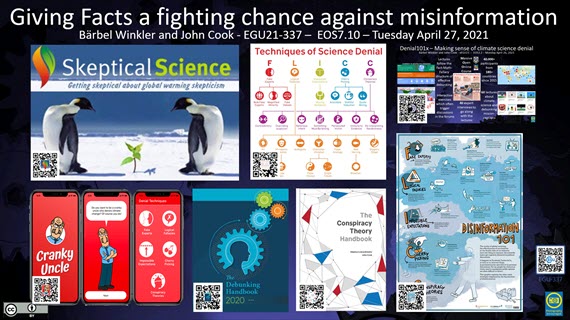 In April, Bärbel Winkler participated in the virtually held week-long European Geoscience Union's General Assembly held as vEGU21 - Gather online. She presented our collection of resources to give facts a fighting chance against misinformtation in session EOS7.10 - Science to Action and introduced our MOOC Denial101x in session EOS3.2 - Climate Literacy.
In April, Bärbel Winkler participated in the virtually held week-long European Geoscience Union's General Assembly held as vEGU21 - Gather online. She presented our collection of resources to give facts a fighting chance against misinformtation in session EOS7.10 - Science to Action and introduced our MOOC Denial101x in session EOS3.2 - Climate Literacy.
In May, John Cook and Bärbel Winkler were invited as panelists in a session about fighting misinformation at the ThinkClima online conference. John talked about “Computer-assisted detection and classification of misinformation about climate change” (video) and Bärbel about “Resources to give facts a fighting chance against misinformation” (video / PDF of presentation).
In December, Peter Jacobs presented The Arctic Is Now Warming Four Times As Fast As the Rest of the Globe with Nathan J L Lenssen, Gavin A. Schmidt & Robert Rohde at the AGU Fall Meeting held in New Orleans and online.
Other Publications
John Cook and Stephan Lewandowsky were among the coordinating lead authors for the COVID-19 Vaccine Communication Handbook published in January 2021. A team of renowned scientific experts joined forces from across the world to help fight the spread of misinformation about the COVID-19 vaccines, which hold the key to beating the deadly pandemic and releasing countries from debilitating lockdown restrictions.
As in previous years, members from our team published articles in various other outlets:
Dana Nuccitelli wrote 13 articles for Yale Climate Connections, John Cook published 3 articles in Monash Lens, and Stephan Lewandowsky published 2 articles in TheConversation.
Projects
Cranky Uncle
Launching the Cranky Uncle Game in December 2020 obviously wasn't the end of the project as it now meant to get it out there and into the hands - or mobile devices! - of as many people as possible. Many of John Cook's presentations this year (see list below) therefore focused on explaining the science behind the game. He also published a Teachers' Guide to Cranky Uncle to provide information about the game and how it could be used in classrooms. Thus far, teachers from 35+ US states and many other countries have shown an interest to utilize the game in their classes within a wide range of topics.
Once version 1 was done and dusted, work on the multi-lingual version started and has been ongoing for several months. Not too surprisingly this turned out to be more involved and complex than initially thought and we hope to finally get it out there in January 2022.
On December 15, Cranky Uncle celebrated his 1st birthday and John Cook published the first part of a new video series explaining The Science of Cranky Uncle:
CARDS - Computer Assisted Recognition of Denial and Skepticism
John Cook recently published the paper “Computer-assisted classification of contrarian claims about climate change” with Travis Coan and Mirjam Nanko from Exeter University, and Constantine Boussalis from Trinity College Dublin. The paper is the result of a research project called CARDS into detecting and categorising misinformation about climate change. The blog post How machine learning holds a key to combating misinformation explains the project for which the researchers used supervised machine learning to detect claims used to cast doubt on climate science and solutions. The initial training of the machine was conducted by the Skeptical Science community in 2018 and you’ll recognize many of the detected claims from our list of rebuttals.
4D - Detect, Deconstruct, Debunk, Deploy
Misinformation is complex and interconnected - you can only solve it with holistic, interdisciplinary solutions. John Cook summarises his last 15 years of countering climate misinformation with the 4D Project: Detect, Deconstruct, Debunk, Deploy. You can find out more in the article Fighting back against climate misinformation and the damage being done published in Monash Univerisity’s Lens blog. CARDS mentioned above is important for the Detect phase of 4D.
Recorded Talks, Podcasts and other outreach activities
Due to the pandemic still forcing a lot of presentations and talks online, quite a few of them have been recorded and are now publicly available.
| January, 19 | Citizens' Climate Lobby Canada |
| January, 26 | Citizens' Climate Lobby AMA with Michael Mann (Dana Nuccitelli) |
| January, 27 | Students against Pseudoscience at Cambridge University |
| February, 2 | Cyberpsychology Center |
| February, 4 | Repustar |
| April, 1 | KISS - Klima in der Schule Symposium (Bärbel Winkler / in German) |
| April, 1 | Skeptical Inquirer - Gaming against misinformation |
| April, 22 | NCSE - Talking Climate Models with John Cook |
| April, 27 | CCL AMA with Dana Nuccitelli and John Cook |
| May, 26 | ThinkClima panel with John Cook and Bärbel Winkler |
| July, 21 | Lamont Summer Series Lecture |
| August 5 | Santa Clara University tUrn - Wildfire Science and Climate Change (Dana Nuccitelli) |
| August 12 | Santa Clara University tUrn - Debunking Climate Myths (Dana Nuccitelli) |
| August, 12 | Bay Area Skeptics |
| November, 30 | Commonwealth Centre for Connected Learning (3CL) |
| December, 10 | Climate Change Chat for Realists with Dr. John Cook |
| December, 18 | Climate Change Chat for Realists with Dr. Ken Rice |
Because our talks page is an often overlooked but helpful resource, Bärbel Winkler highlighted it in her blog post A helpful resource: John Cook's presentations about countering misinformation.
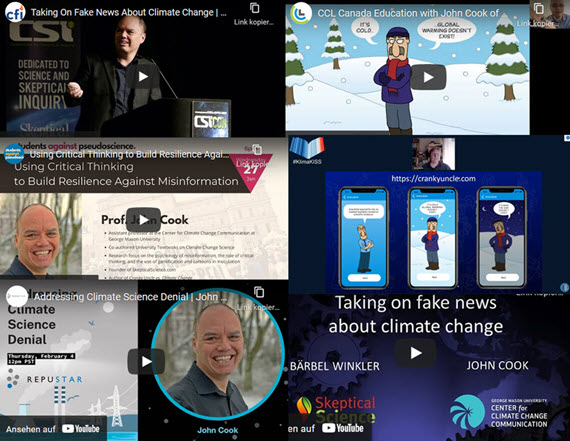
Our MOOC Denial101x
 Denial101x was again available throughout the year as one long-running self-paced version, attracting over 1,500 participants. This year's run was recently extended to run until February 28, 2022, so there's still ample time to work through the lectures if you decide to register now. Next year's self-paced run starts in early February 2022 and will then again be available for over a year.
Denial101x was again available throughout the year as one long-running self-paced version, attracting over 1,500 participants. This year's run was recently extended to run until February 28, 2022, so there's still ample time to work through the lectures if you decide to register now. Next year's self-paced run starts in early February 2022 and will then again be available for over a year.
The Skeptical Science Fellowship
Successfully completing Denial101x is a prerquesitite to apply for the new Skeptical Science Fellowship launched in September. Once you've completed 80% of the course's assessment, you've officially passed the course and you can apply to start the SkS Fellowship via our google form. The Fellowship is a program that provides training and mentoring in climate communication and debunking misinformation. Anyone who completes the program will be listed as a Skeptical Science Fellow.

Some team news
John Cook left George Mason University's Climate Change Communication Center at the end of February and moved back to Australia where he continues his misinformation research as a post-doctoral research fellow at the Climate Change Communication Research Hub at Monash University.
Dana Nuccitelli joined Citizens Climate Lobby as their research coordinator after volunteering for the organization's Sacramento chapter for nine years.
Carbon Brief Quiz 2021
On November 8 we participated for the second time in the annual Quiz Night organized by Carbon Brief. The event usually takes place at a bar in central London, but this year it was held as a hybrid event with some teams gathering in Glasgow and many others joining via Zoom. Around 60 teams and more than 600 participants had joined this fun competition. Compared to last year, when we ended up in 45th place with 56 points we did a lot better this time around and made joined 15th place with 75 out of 100 possible. Simply participating in an event like this is fun, so we plan to do so again next year with a hopefully bigger team to be able to cover a wider range of questions thrown at us! You can read about the event over at Carbon Brief where detailed stats are available as well as all the quiz questions and their answers.
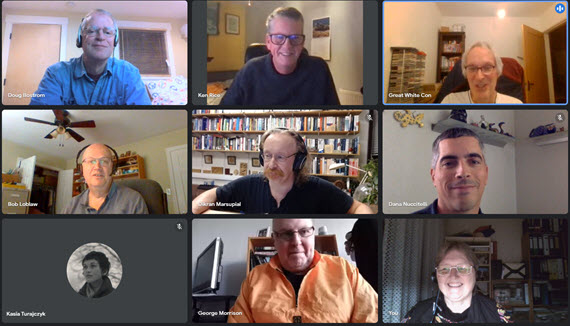
Website activities
Blog posts
Several of our blog series kept getting published throughout the year. Bärbel Winkler took over publishing the weekly summaries of articles shared on our Facebook page in March when John Hartz took a well-deserved break. Kudos and big Thanks to John for all his work thus far over the last couple of years! On most days, we shared 3 to 4 articles related to climate science and/or tackling misinformation and even though we don't have a calculated number will have shared at least 1,000 articles via that route all told.
Doug Bostrom published his New Research posts on a weekly basis on Wednesdays or Thursdays, getting help with the article collection from Marc Kodack starting in autumn. This past year in we've listed 5,495 articles dealing with essentially all aspects of our accidental unleashing of harmfully rapid climate change. Due to data source limitations we do not have an exact count but at least 30,793 researchers contributed to findings covered in these publications, in some 193 separate journals. An encouraging feature is that over a very few years a key statistic has improved; of the total listings for 2021 no fewer than 3,191 are open-access by one means or another, all legal. The final edition of New Research for 2021 has more information about the series.
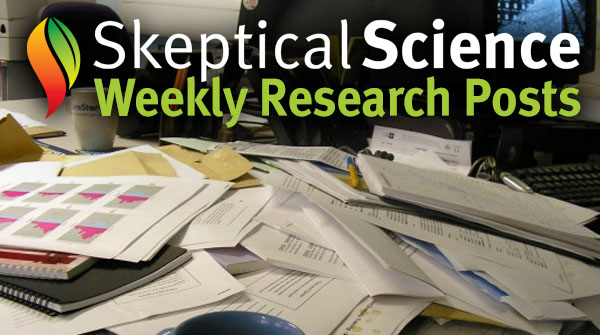
Dana Nuccitelli reposted his articles published in other outlets (see list above) and wrote several original articles for SkS. Evan and John Garrett (jg) published more articles in their Analogies series and Evan wrote a three-part series about the Keeling Curve. Other members providing serveral articles were John Cook and Bärbel Winkler. We also started to repost selected articles from Melanie Trecek-King's website Thinking is Power. The articles provide a lot of foundational information related to critical thinking and combatting misinformation.
Rebuttals
At the end of May we published a plea for help to improve our rebuttals and it didn't take long for volunteers to offer their help with either adding references to our glossary or finding replacements for broken links. The glossary activity turned into a big win not just for us but also for Tara Holland's climate change class at Simon Fraser University in Canada. You can read more about this successful collaboration in Volunteer opportunity turned into a big win for SkS and students! The second activity to fix broken links is ongoing and will most likely turn into a never-ending-story!
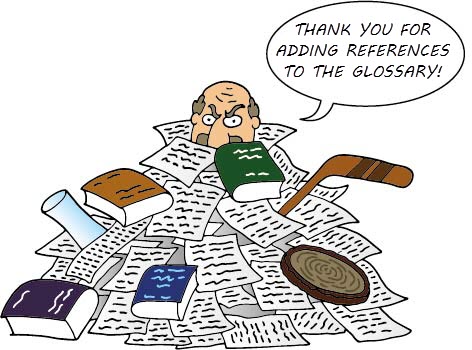
Collaborations
In May we announced our collaboration with Repustar to provide Fact Briefsand have since then published 16 Fact Briefs. Especially the last of these comes with a rather interesting back story we tell in From tweet to updated rebuttal - a little saga. It also resulted in completely overhauled basic and intermediate rebuttal versions to answer the question "Do high levels of CO2 in the past contradict the warming effect of CO2?".
Translations
Translation activities during 2020, coordinated by Bärbel Winkler, were dominated by the various important and very timely handbooks: The Conspiracy Theory Handbook (Turkish, Czech and Polish), the The Debunking Handbook 2020 (Spanish, Ukranian and Dutch) and The COVID-19 Vaccine Communication Handbook. Some of these translations were created by SkS translator teams while others came about due to generous offers from outside our team. We recently published a summary blog post highlighting the seven handbook translations created since August 2021.
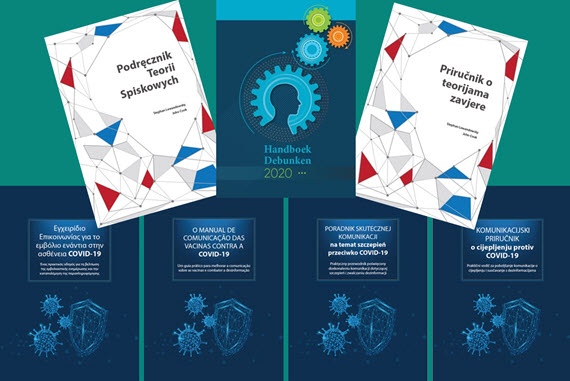
Another big translation activity currently going on behind the scenes is the one for John Cook's Cranky Uncle Game which was initially launched in December 2020. The German and Dutch translations are complete and many other languages are currently in the works, among them Spanish, French, Portuguese, Italian, Polish, Romanian and Swedish. We'll share more about the particularities of these translations once the multi-lingual version is out of BETA-testing and we have some actual examples to show you.
Social media
Our Facebook page has been doing fairly well with around 179,000 followers, but down a bit compared to 2020. We try to share between 3 and 4 articles per day, selecting content focusing on climate science research or combatting misinformation.
On Twitter we have ca. 23,300 followers, up by about 800 compared to a year ago.
Our presence on MeWe, a relatively new social media platform which promises to stay ad- and tracking free has grown steadily during the year and now has more than 1,770 followers. How about joining our other Followers on MeWe to increase our base there as we head into 2022?
What to expect for 2022?
As mentioned above, one of the first items on our to-do list for 2022 is to launch the multi-lingual version of the Cranky Uncle game with German and Dutch as the first languages. More translations will then be made available as they are finalized, so this will be an ongoing process and it should be fun seeing Cranky Uncle "learning" more languages throughout the year! It'll be then interesting to see where and how the game will be put to good use. More features are already in the works for the Cranky Uncle game and we'll keep you posted about them.
Thanks for reading and all the best for whatever 2022 has in store for us all. While we pride ourselves on running a highly efficient "all-volunteer" operation, the technical underpinnings of our internet-based publishing system require money for day-day operation. You can help to propel Skeptical Science through another successful year of improving our critical thinking skills by contributing here. For US taxpayers squeezing under the wire, contributions to Skeptical Science are tax-deductible.































 Arguments
Arguments





















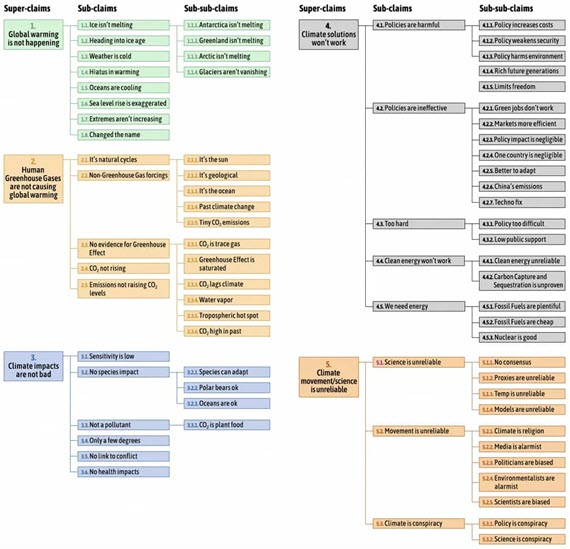
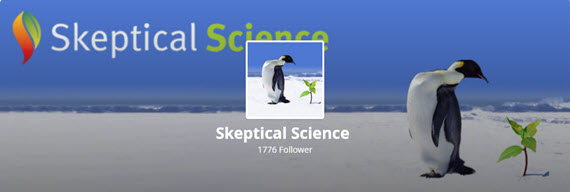
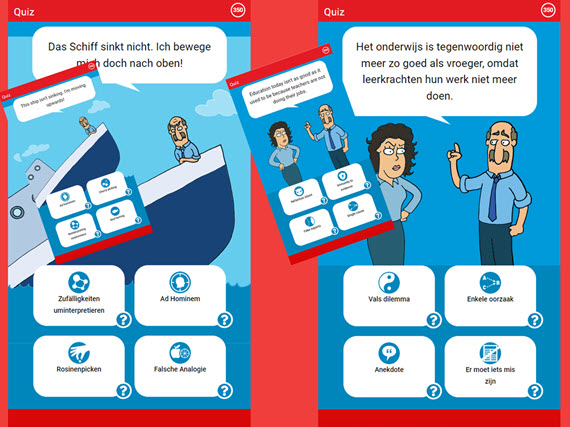









Comments